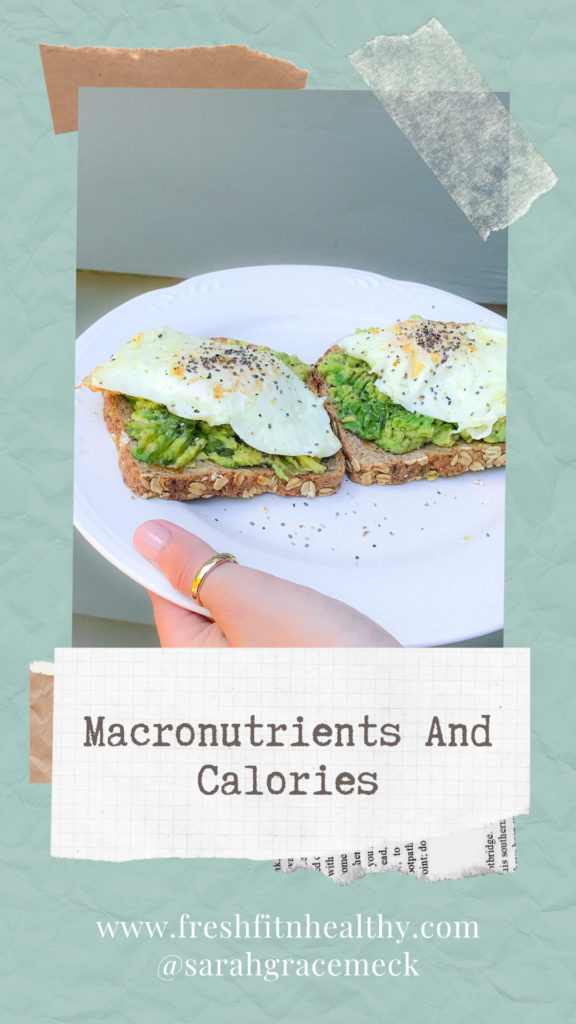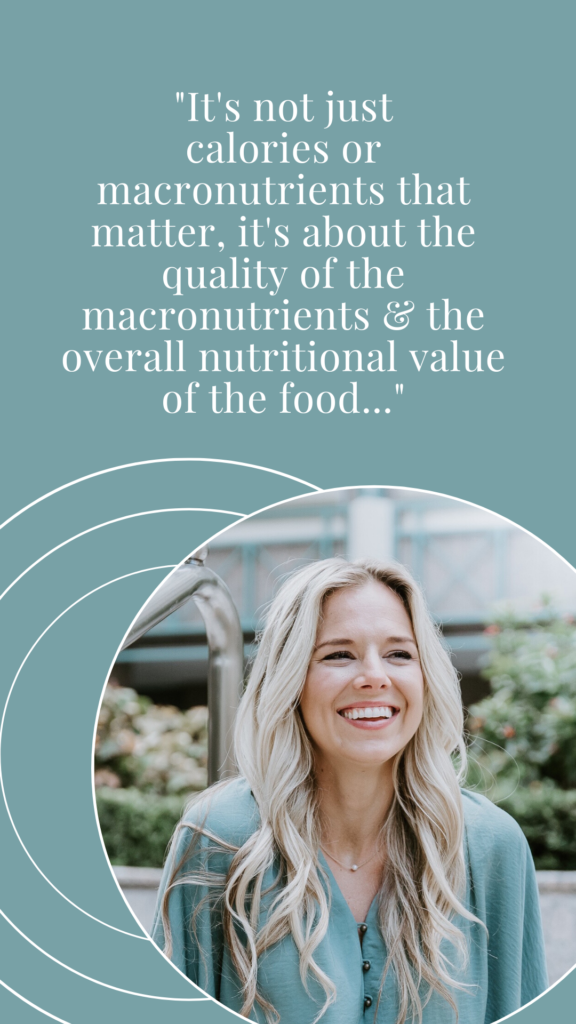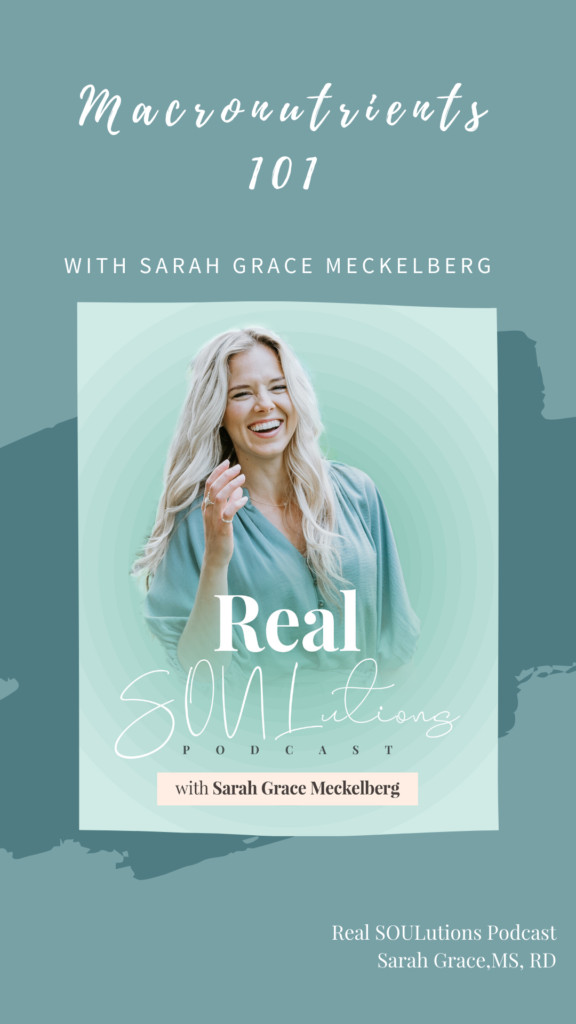Want to learn what macronutrients are and the importance of them?
Hey Guys! Today I’m going to be breaking down macros or macronutrients. I know we hear this word a lot but do you really know the importance of them? Or the difference between calories and macros in general? I’m also going to be sharing how I balance caring about macronutrients and calories but also above all listening to my body and eating intuitively.
Listen to the Podcast on iTunes right here
Listen to the Podcast on Spotify here

What Are Macronutrients?
You’ve probably heard someone say they count calories, or that they are counting their macros. What’s the difference between these two? Macronutrients make up your total calories. Every single macronutrient is assigned a caloric value. So for every gram of protein and every gram of carbohydrate there are 4 calories. Fats are a little different, for every gram of fat there is 9 calories. Basically when you’re tracking macros you’re also hitting a specific calorie amount even if you don’t know it.
Calories do matter and they do count BUT not all calories are not the same. Some are packed with nutrition and are nutrient dense therefore will digest and fuel your body differently than say empty ones which lack nutrients. You’ll hear for weight loss it’s just about calories in vs calories out. And yes that is true the amount of calories DO matter, but quality matters MORE. Your body’s hunger and fullness will be better regulated with a nutrient-dense diet. It’ll be harder to overeat, according to your needs when you’re eating nutrient dense foods and the right kind of macronutrients.
Why Is This Important?
As a dietitian I know in order to truly honor your body and eat intuitively you first need to know how to honor your body through nutrition. If you know nothing about macronutrients or balancing your meals as I promote with my #FreshFitnFive then how can you honor your body with nutrition? This is why as a dietitian I think you need a strong foundation of what your body needs to feel its best and thrive before you can “honor your body with gentle nutrition”. What are proteins, carbs, and fats? What are smart sources of them? And how can you balance your meals with all of these macronutrients.
The difference between a smart macro balanced meal vs a not smart meal in general is eating a soda/cookie vs eating a greek yogurt parfait. The soda/cookie is super empty in nutrient value and full of simple carbs and sugars. These will quickly digest in your system and spike your blood sugar leaving you lethargic and hungry again. On the other side the greek yogurt parfait contains healthy proteins, fats, and smart carbs.This meal will digest slower, stabilize your blood sugar, and balance your hunger hormones. Leaving you energized, satisfied, and full for a long time. This is why I teach my clients, as well as in my Diet Like A Dietitian Guide that it’s less about calories, and more about the quality of food you’re eating.
How To Start
With my specific clients I have them track or food journal the first part with me.Food journalling or tracking is a great way to become aware of your current eating, especially if you’re just starting out. Eventually you will know what a balanced meal looks like, and what a smart carb looks like, without counting or food journaling. Creating nutrition foundation by tracking at the start is what ALLOWS FREEDOM. With a nutrition foundation it’s less about numbers and more about knowing how to fuel your body to feel your best. If you want to feel your best you do have to focus on nutrition and fueling yourself properly. Without this nutrition foundation you could be hitting your allotted grams of carbs, or grams of protein for the day. But filling up on empty, nutrient lacking choices.

Macronutrients Breakdown
If you’re interested in really creating a firm nutrition foundation and more, make sure to check out my Nutrition Guide https://www.sarahgracemeck.com/nutritionguide
The Basics:
Proteins, fats, and carbs make up your daily caloric value. If you eat a certain number of grams of such, then you can add those grams up to see how many calories you’ve eaten for the day.
Proteins
Proteins keep our bodies functioning properly! They make up our tissues, muscle, enzymes, hormones, antibodies and so much more. As you can see proteins are so vital for our bodies health! It’s the only macronutrient not stored. Meaning you need a good amount of it everyday. Some examples of good sources of protein are lean red meats such as beef, egg whites, turkey or chicken breast. When shaping your meals, you want to include around 15-20g at each meal min. An easy tip is including a serving of protein the size of your palm during each meal.
Fats
Fats maintain our body temperature, support immunity, cushion and protect vital organs, and assist in vitamin absorption. They also provide a source of energy for long-term, facilitates nerve transmission, and are needed for your body to make hormones. Some sources of healthy fats are poly and monounsaturated such as olive oil, salmon, and nuts. Fats usually come in during the cooking process such as the oil you use when cooking.
Carbohydrates
Carbs are our body’s main energy source for the body and brain. They also help maintain athletic intensity, prevent muscle breakdown, assist in hydration, and more. There are different kinds of carbs! Carbs can be a source of quick energy vs slow-digesting. The only time you should focus on including quick digesting carbs are for athletes before they workout. They are simple sugars such as white bread, white rice, and fruit. Within your day, when youre not working out you are mainly going to want slow digesting carbs which contain nutrients and fiber. These wont spike or drop your blood sugar, or leave you feeling hungry. Examples of these are sweet potatoes, brown rice, oatmeal, and whole grain breads. Fruit that has a good amount of fiber in it such as apples and pears are slower digesting than other carbs.
There are foods which are combinations of macronutrients. For example any dairy is going to have proteins, fats, and some carbs. But if you have 0% greek yogurt it’ll contain just carbs and protein. Most proteins besides the lean choices will have some fat in them.
Why I created the FreshFitnFIVE!
The biggest question I get is how many calories should I be eating. So when it comes to your needs how many calories or macros you should be having? Well everyone is DIFFERENT. I would have to be working with you one on one to even try and figure that out. Even with calculations they can be so off. On the other side when trying to hit a certain number you can also be so off.
This is why I created the FreshFitnFIVE. The FreshFitnFIVE is SMART Proteins, Fats ,Carbs ++ fiber and a boost. Which is boosting the flavor naturally with something like lemon juice or seasonings. Including all 5 of these during every meal is KEY. And for snacks include 2-3! Utilizing this will make you more aware of macro balanced meals that regulate your hunger hormones, will help you feel more satisfied, lead to less cravings, and lead to overall daily nutrient-dense intake naturally (vs counting long term). If you want to find out more about the FreshFitnFIVE click here.
But a good GENERALIZED RANGE for people is:
—20-30% protein, or at least 1.5-2g/kg
—40-60% carbs
— 20-30% fat
To sum it all up it’s a balance of considering nutrient-dense, balanced meals and snacks while also listening to your body above all. This is why tracking in the beginning for awareness can be helpful! Tracking is a tool for education, not to become obsessed with numbers. It’s a great place to start if you don’t really know anything about nutrition. The Long Term Goal is to be able to eyeball portions and macro balanced plates. Learning it’s not about every snack and meal being balanced and healthy. But rather if you’re going to have a more nutrient lacking choice in the morning to then make better nutrient dense choices throughout the day. Using this education so you can honor your body through gentle nutrition, live and eat FREELY so you can be your best in life!
Take this to the next level and become your very own nutrition expert through my Diet like a Dietitian Nutrition Guide. Find more info right here: https://www.sarahgracemeck.com/nutritionguide

